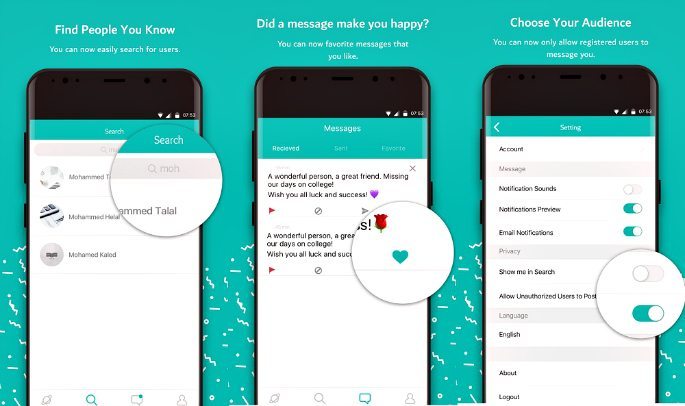"When it goes to the wrong hands, it adds another form of cyberbullying."
Have you heard of the new mobile app Sarahah? Chances are you probably have, as it has become popular across the world.
Designed as an anonymous message service, it provides users with the ability to send messages to each other, keeping their identities hidden.
Sarahah began life as a tool for workplaces in February 2017. Created by developer Zain al-Abidin, he wanted to give a voice to those who felt uncomfortable with expressing their opinions.
The developer first created a website, where employees could send anonymous messages to their employers.
However, its popularity soon took off when Zain al-Abidin decided to extend it beyond the workplace. He also explored how friends, family and even acquaintances may want to provide feedback to each other. Opinions they may not want to air publicly.
Finding success in the Middle East and Africa, the developer decided to transform Sarahah into an app. Released on 13th June 2017, it has found users worldwide.
But how does this app exactly work? With the purpose of it lying in confidentiality, is it really helpful for you? Or does it leave you open to potential internet trolls?
Sarahah ~ Confidential Constructive Criticism
Once you have registered an account on this messaging service, others can now have the ability to contact you. All you need to do is pass the link out to friends and family. Anyone who has a link to your account can send a message. Regardless of whether they use the app or not.
When someone creates a message, Sarahah prompts the person to “leave a constructive message”. This follows in with its original purpose of sharing useful criticism, helping a person to develop themselves in any strand of life.
Keep in mind though, you cannot find the identity of the person who sent you a message. Nor can you reply to them. Instead, Sarahah lets you contemplate the feedback received in the message and how you want to react to it. Whether you simply ignore it or grow from it.
Its design, both on its website and mobile app forms, appear clear and simple to use. With the attraction of sending messages anonymously, many young South Asians have flocked to the app. Sharing their links on social media, Sarahah has become a top trend on Twitter as Indians and Pakistanis rave about the service.
Even Zain al-Abidin is delighted with the app’s growth in South Asia, particularly India. He has previously said: “I am really proud that Sarahah has reached India…and I am very proud and happy to see Indians coming to Sarahah.”
But let’s take a closer look to see how it can benefit you or the trolls.
Helpful Feedback or Cyberbullying?
As the key principle behind the app is constructive criticism, many will use Sarahah for the chance to self-improve. By receiving feedback on any aspect of their life, people can see what exactly they need to do to develop.
In addition, anonymity offers those with the chance to air their honest thoughts, with no unexpected repercussions or conflict.
However, the line between helpful feedback and insulting messages can become very thin, casting a grey area. While some may use the service to provide useful criticism, others may also use the opportunity to harass.
Could Sarahah actually become the ideal location for trolls to verbally attack others?
Divya, a British-Asian student, says: “When it goes to the wrong hands, it adds another form of cyberbullying, especially as you don’t know who sent the message. It gives rise to trolls and gives them more power.”
“It’s another platform to hide behind,” adds Mahima, “You can leave a comment and no one knows who it’s from.”
In response to claims of potential cyberbullying, Zaid al-Abidin implemented a number of features to avoid such harassment. These include the option to block users, flag abusive content and an option to control who can send you messages.
Despite these additions, it’s hard to tell whether this will hinder potential trolls. Or if they can find a loophole.
A Healthy Way to Critique?
In typical interactions surrounding criticism, it usually follows a two-way conversation. Where one person offers feedback, the other can either accept or question the critiques. In this, a flow of ideas and suggestions are communicated between two individuals, directing to a resolve.
Sarahah potentially removes this discussion, making it one-sided. If a person receives criticism they don’t understand or agree with, they cannot reply and ask further on the matter. This can lead to potentially over-thinking, pondering on questions that may never be answered. Who said this? Why would they say this?
Arjun, a young British-Asian, gave his thoughts on this aspect. He said:
“The sole use is to message someone with no option to engage in constructive dialogue. I can’t see how people wishing to make any positive change would use this route. Those attracted to one-sided dialogue are not likely to be looking for a legitimate discussion.”
These confidential messages can also affect the factor of interpretation. In face-to-face dialogues, expression and facial tone are key. Sarahah also removes this, as Mahima explains: “Giving feedback by [messages] can be taken depending on your mood. You can’t see their expression, so you don’t know how to take it.”
In addition, this way of providing feedback could become detrimental to Sarahah users. Particularly with many young South Asians and British Asians. Divya commented: “Comments can be damaging to impressionable, young people.”
Social media and the internet already have the potential of affecting youngsters’ self-esteem and confidence. This could create an even bigger impact with the use of anonymity.
Beneficial for You or the Trolls?
While the messaging service remains relatively new to the social media scene, it seems it has already created a controversial reaction. With concerns over potential cyberbullying, damaging messages and unbalanced one-sided discussions, this could mark as a new stepping stone for internet trolls.
Meanwhile, its opportunity to provide honest feedback, removing the risk of unexpected conflicts will still make Sarahah desirable. Its growing popularity now even reaching the likes of the US and UK means it will continue to thrive.
But who does it truly benefit?
For now, it seems to many that the app offers an upper hand to trolls. However, with Sarahah’s developer implementing features to tackle cyberbullying, Zain al-Abidin has shown he wants to maintain the app’s honest intentions.
If he continues to improve it and eradicate the hazards, then the answer to the question of who will benefit is sure to generate a more positive response.
































































